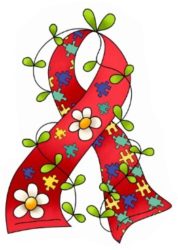Faking Normal is a series written by guest blogger J, an adult on the autism spectrum. Her other articles can be found here.
April was official Autism Awareness Month. I was sort of shocked to discover that a lot of autistic people hate that phrase, and after doing some research and thinking about it, I understand why.
Many would prefer Autism Acceptance. I know that sounds like a minor semantic distinction, but it really isn’t. To explain why, I’m going to use an analogy with which I think most people can identify: body image.
Just about everyone I know has some sort of body image issue, whether it’s height, weight, scarring, or any other thing that makes them uncomfortable. Body image awareness implies that it’s something about which everyone should be aware and recognizing at all times. That, I think, is the opposite of what most people want. Few people want to be reminded of their perceived physical flaws.
Acceptance, on the other hand, implies that you just let people be people without needing to observe and note every physical thing that might make them different.
This isn’t to say that you should ignore the ways in which I am different. It is one thing to notice that I am really tall, skinny, or autistic (and I am all of those things). It's quite another to think that those characteristics define who I am. I haven’t met many openly autistic adults in my life, but every time I have, I knew within five seconds of talking to them that they were like me, even though none of them said anything until much later in the conversation. I may have been aware that they were autistic, but it didn’t dominate the discussion. First and foremost, I was talking to a human being. Also, while there are some things that people on the spectrum have in common, that doesn’t make us clones of each other.
I do think awareness of an overall condition is important when it comes to fundraising or advocacy. Certainly organizations like WAAA could not accomplish everything they do without autism awareness. But on an individual level, the term on its own doesn’t sit quite right with me anymore.
On the flip side, acceptance could be construed to imply that we’re just supposed to accept autism and not do anything about it. That’s not okay either. While many of us (myself included) do not want to be singled out (or cured for that matter), it is important that everyone on the autism spectrum have access to treatments such as early intervention to give them a better shot at success in life. In order to accomplish that, we also need awareness.
Another thing of which I’ve recently been made aware is that a lot of people believe that practicing acceptance and awareness requires that everyone with autism be open about who they are. I’ve taken a surprising amount of heat for publishing my articles anonymously, but I firmly believe that it is up to an individual to decide what to reveal about him or herself. I can’t tell you how many times I’ve told someone that I was on the autism spectrum, even someone who has known me for a long time, and suddenly they start talking to me very loudly and very slowly, like I’m hard of hearing and can’t understand things. So I don’t do it much anymore.
For the month of April, I hung an autism ribbon outside of my office. I told people that it was for Autism Acceptance and Awareness, because both things are important. Awareness overall and acceptance for individuals. We need awareness for effective advocacy. We need acceptance because we’re unique individuals and should be treated as such.
Thank you to JAF for his help in editing this.


